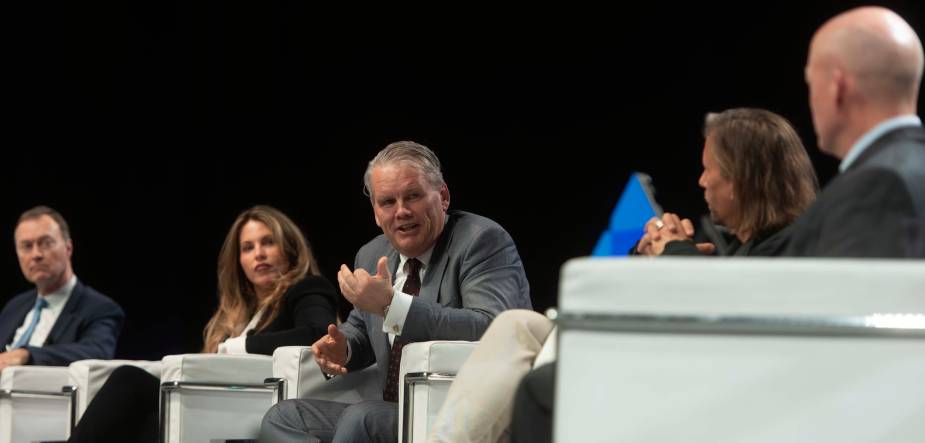Matthew Parizot - 02 May 2022
The CIMBC22 Convention opening keynote and plenary address how miners should recognize and alter their ways of thinking to better adapt to an ever-changing industry
by Matthew Parizot
On the morning of Monday, May 2, 930 visitors to the Vancouver Convention Centre poured into Ballroom C to attend the opening keynote and plenary at the CIM Convention + Expo 2022. It was the convention’s first appearance in Vancouver since 2018 and CIM’s first in-person convention since the beginning of the COVID-19 pandemic.
Kicked by off a performance from the Eagle Song Dancers, the mic then turned to Teck President and CEO Don Lindsay and CIM President Pierre Julien, who introduced the main keynote speaker: Lab of Misfits/Lab of Misfits AR founder and CEO Beau Lotto, a neuroscientist, author and expert on perception who works to help companies change their perspectives and open their minds to new ideas and opportunities.
Lotto’s keynote focused on how the brain uses history, assumptions and biases to perceive the world around it, dating back to the early species of human developing intelligence to avoid predators and stay alive. While humans no longer need to worry about natural predators in the wild, our brains still function much the same, using past experiences and traditions to inform our current perception of reality.
“There’s a lot of value to be found in the past, and the assumption is that what worked before is going to work again,” Lotto said. Tradition that’s grounded in the past offers both insights, but also snares, traps.”
Using a combination of humour, illusions and valuable insight, Lotto demonstrated to the crowd how their brains create assumptions and make decisions without making a conscious choice to. So, when forced to make a decision, we tend to fall back on options that worked in the past.
“When we are faced with a moment of fear and uncertainty, one of our best strategies, like a deer in the headlights, is to stand still. We struggle in the face of movement to not move. We create arguments for why we should stand still. We argue for staying put,” Lotto said.
On how to make better decisions, Lotto gave several suggestions, one of which involved learning more about perceptions to increase what he called your “perceptional intelligence.” Being able to recognize your biases and assumptions, and those of other people, can open pathways that were not previously there.
“Perceptional intelligence is a wonderful engine of humility, and creativity begins with humility,” Lotto said.
Following Lotto’s keynote speech came the plenary session. Titled “Future Needs of the Industry,” the panel comprised experts from numerous sectors in and out of mining to give a forward-looking perspective on what mining needs and where it is headed. Moderated by Hatch senior advisor Doris Hiam-Galvez, the panelists included Lindsay, Lotto, Newmont executive vice-president and chief technology officer Dean Gehring, energy transition and sustainability lead at Google Cloud Trinity Lloyd and Wheaton Precious Metals president and CEO Randy Smallwood.
Starting off on a question about what the largest barriers are for investment in Canada, Lindsay stated that “I think the most important issue is establishing confidence and predictability around the rules and regulations for permitting. We’ve had several examples within our company and our portfolio where we’ve invested for years and years and gotten over all the hurdles successfully. And even though we’ve done that, we still received a negative answer.”
Lindsay also answered a question from the audience about the feasibility of net-zero emissions strategies for mining companies, breaking down the difference between scope 1, 2 and 3 emissions. In his response, Lindsay revealed that Teck is aiming to reach net-zero scope 2 emissions by 2025 but could reach that mark as soon as this year.
When asked about what makes Canada a premier jurisdiction for resource development, Smallwood used an example of a cobalt operation out of Voisey’s Bay that Wheaton invested in because of the ability for companies to track the provenance of the minerals, creating a more attractive product.
“When we look around the world, we have an incredible opportunity here in Canada to show the way,” Smallwood said. “[We need] to recognize that we, as a country, our differentiating factor, our advantage that we have over other jurisdiction, is the fact that we have a wealth of resources. And that doesn’t mean that we exploit them, it means that we manage them.”
Lloyd, when asked about how mining can take advantage of data to lead the transition to green energy, suggested that mining can look to energy industries as an example of the possible issues that it will face during its transition to renewable energy, and how data can help to answer some of the questions that will arise.
“We see this [transition] happening in energy, so while data has no value, information does and context does. Looking across the organizations, looking internally to your organization, looking across partnerships, all of these are really critical components to taking data, which by itself doesn't have value, pushing it together a bit and determining what piece of the puzzle can help me solve these problems, what the future of my organization looks like and what the future of our industry looks like,” Lloyd said.
Gehring spoke on how prepared the industry is in terms of skills, and how the constant evolution of the world and different challenges that companies face require a greater diversity of thought and skills than was previously required.
“We have a tendency to take complex information and distill it to a point estimate, we do it all the time,” Gehring said. “We need to get more comfortable understanding the range of possibilities, because as the world gets more complex, applying that point solution we've been doing for centuries isn't going to give us the answers we need. So, we need people who think differently and recognize ranges of possibilities.”
 - dev.png)


